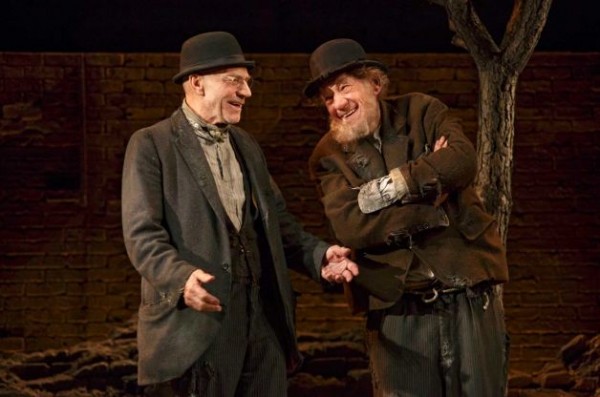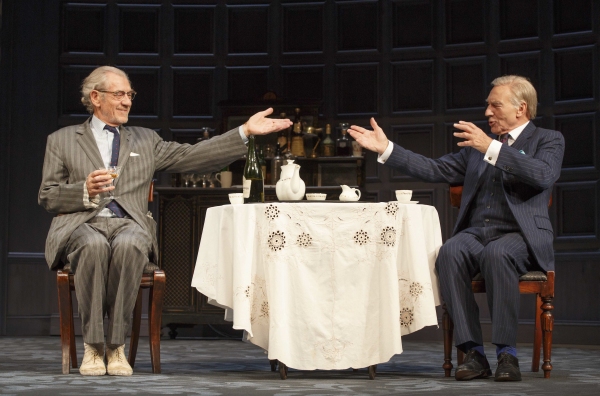
Didi (Patrick Stewart) and Gogo (Ian McKellen) joke around while waiting for Godot in Samuel Beckett masterpiece (photo by Joan Marcus)
Cort Theatre
138 West 48th St. between Sixth & Seventh Aves.
Extended through March 30, $40 – $147
www.twoplaysinrep.com
For the past five months, British thespians Patrick Stewart and Ian McKellen have been having a blast in New York, as they perform two existential masterpieces in repertory on Broadway and travel all over the city in their bowler hats, posting fabulous pictures on their twitter sites. Sir Ian and Sir Pat are now entering the last week of two marvelous productions, Samuel Beckett’s Waiting for Godot and Harold Pinter’s No Man’s Land, running at the Cort Theatre through March 30. The two men, who have previously starred opposite each other as frenemies in the X-Men movies, first teamed up for Godot in London in 2009; they had such a good time, they decided to bring it to Broadway. It was director Sean Mathias’s idea to add Pinter’s 1975 drawing-room romp, and the two plays work extremely well together, like a pair of old friends enjoying each other’s company. In Waiting for Godot — the last word of which you will forever pronounce with the accent on the second syllable after seeing this show — McKellen is Estragon (Gogo) and Stewart is Vladimir (Didi), two homeless men who are expecting a man named Godot to arrive. In between Gogo’s concern for his boots and Didi’s frequent trips to relieve himself, the drifters engage in such surreal dialogue as E: “He should be here.” V: “He didn’t say for sure he’d come.” E: “And if he doesn’t come?” V: “We’ll come back tomorrow.” E: “And then the day after tomorrow.” V: “Possibly.” E: “And so on.” V: “The point is —” E: “Until he comes.” V: “You’re merciless.” E: “We came here yesterday.” V: “Ah no, there you’re mistaken.” E: “What did we do yesterday?” V: “What did we do yesterday?” E: “Yes.” V: “Why . . . Nothing is certain when you’re about.” Indeed, nothing is certain in the two-and-a-half-hour, two-act play, even when the pompous Pozzo (Shuler Hensley) arrives, led by his apparent human slave, Lucky (Billy Crudup). What’s it all about? That’s something that theatergoers and critics have been contemplating and arguing about for some fifty years, getting little help from Beckett himself. The beauty of Godot is that it is about everything and nothing, perhaps the most entertaining and perplexing Rorschach test ever conceived. It’s really about whatever you want it to be, including, very simply, exceptional theater.

Spooner (Ian McKellen) and Hirst (Patrick Stewart) rehash the past in Harold Pinter classic (photo by Joan Marcus)
Much is left up to the audience to figure out in the absurdist black comedy No Man’s Land as well. After meeting in a pub, the wealthy, impeccably dressed Hirst (Stewart, wearing a wonderful pair of bright blue socks and a fashionable toupee) brings home the somewhat less erudite but scholarly Spooner (McKellen) for further conversation and top-shelf liquor. The two men discuss life and love, aging and infidelity, poetry and memory, occasionally joined by Foster (Crudup) and Briggs (Hensley), who may or may not be Hirst’s sons or servants. (The four characters are named after great cricketers — not that that lends insight into who they are or what they actually represent, other than that Pinter is playing yet more games with his story.) Stewart and McKellen, in roles originated by a pair of other sirs, Ralph Richardson and John Gielgud, respectively, are utterly delightful as the two gents. Are they old college friends? Romantic competitors? Two halves of the same person? As in Waiting for Godot, the significantly more acerbic No Man’s Land is open for vast interpretation as well, although it provides far more clues. Both plays are splendidly directed by Mathias (Bent), who honors the spirit of each play without getting overly fancy or dramatic, and feature exemplary sets and costumes designed by Stephen Brimson Lewis that evoke heaven, hell, and the way station in between. Over the past dozen years or so, McKellen (King Lear, Dance of Death) and Stewart (A Christmas Carol, Macbeth) have appeared on the New York stage separately, but there’s nothing quite like seeing them together on Broadway, in a pair of stellar productions that allow them to have just as much fun as the audience.